National Bread Week runs from 10-16 September and celebrates all that is great about Irish loaves. Events will be taking place in bakeries and stores across Ireland, with lots of tastings and promotions on offer. For further information, visit www.nationalbreadweek.ie or join the conversation on Twitter at #BreadLover
Durrow Mills
In 2015, Lisa Larkin and her husband Tom recognised a gap in the Irish food market. Marrying this with a passion for real and wholesome food and an understanding of common digestive issues, Lisa began milling sprouted wheat flour at her very own Durrow Mills.
Lisa journeyed the road less travelled with her sprouted wheat business, as she is the first and only producer of the flour in Ireland and the UK, which was launched officially at Ploughing 2017. Originally from Glenageary in Dublin, Lisa settled with husband Tom and their four kids in his home county of Westmeath 11 years ago.
“I’ve always had a real interest in country life,” she explains. “I wouldn’t move for anything now. I love giving back to the community and so I always want my business to remain local.”

Lisa Larkin, Durrow Mills.
Lisa and Tom both completed a bachelor in agricultural science at UCD. He specialised in engineering while she went on to do a research master’s in animal reproduction.
Digestive issues in Lisa’s family led her to sprouted wheat.
“I really wanted to try it. But I couldn’t get it in Ireland,” she says. “It was only made in the USA at the time and was very expensive to import.”
While ordinary flour is formed when the cereal grain is directly milled, Lisa’s sprouted flour comes from organic, high protein grain, placed in large vessels to be rehydrated. It is left to germinate to a correct stage before being very gently dried. Then it is stone milled.
“It is a very tricky product to make. We had to build all of the equipment ourselves,” Lisa explains.
“The germination of the grain changes all the properties of the grain. It breaks down indigestible portions of the grain that are naturally there. It also makes it more nutritious.”
The sprouting of the grain adds another three or four days on to the overall process. Despite the cost of time, Lisa is delighted to support wholesome and traditional food prep. Many people who have turned away from other wheat products due to digestive problems have reported positively on Lisa’s sprouted wheat.
“Sprouting is just one method to break down the indigestible portions of the grain,” she says. “It’s just going back to real food.”
Every step of this specialised milling is done by Lisa and Tom. “You need to monitor everything very carefully,” she says of the process. “It took me a long time to get it right and come up with a high-quality product that is good for baking.”
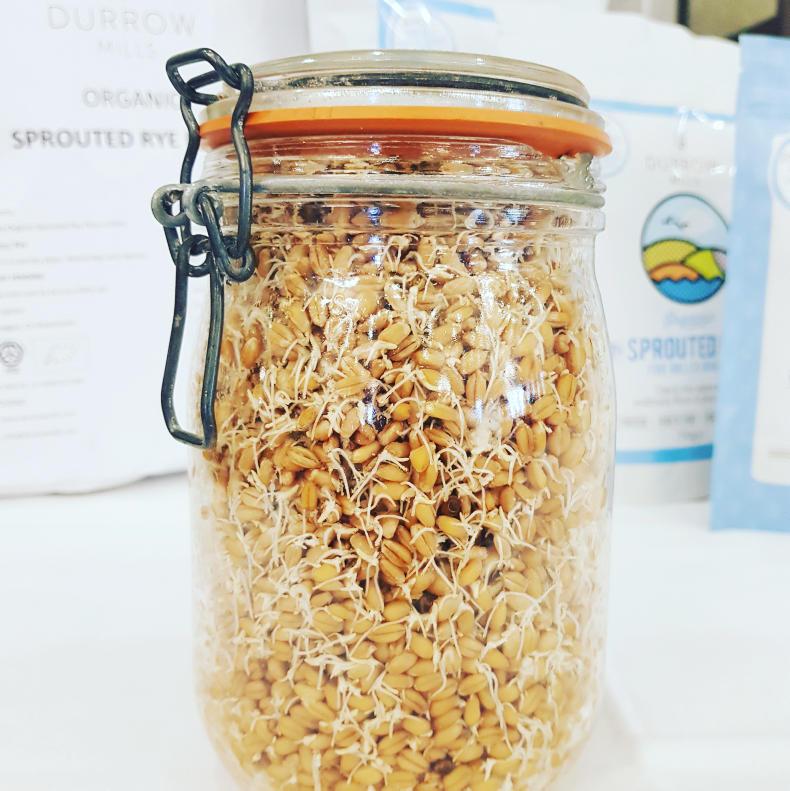
Durrow Mills.
Describing her product, Lisa says, “it is a very versatile flour. You use it in place of or blend it in with other flour. It is high in fibre because we use the whole grain. It has much higher protein as well,” she explains.
As a member of the “Real Bread Ireland Campaign”, Lisa hopes for a return to “real bread” without additives; “just water, flour and a pinch of salt.”
“Bread used to be the staple diet of everyone,” she says. “It seems now that bread has been villainised. I think eating natural and seasonal food is the best kind of diet. I am a believer in organic as I do wonder about pesticides and other chemicals leaking into the food chain. But this is not a trend. It’s just about eating proper food without the additives and preservatives. Everything in moderation.”
Durrow Mills is a growing success, with a recent Blas na hEireann chef’s choice award, a nomination for the Food and Drink Business awards and an innovation voucher from Enterprise Ireland, with plans to open a small research and development bakery for taste and trial purposes and to give them a new opening at food festivals.
“As flour is a raw product, it is very difficult to get people to adopt a new product without having tried it,” says Lisa. “Once they can taste it, they generally really like it. So, that’s why we are opening the research and development bakery.”
Although her main focus lies with supplying bakeries with the flour, this year Lisa hopes to introduce new flours to the Durrow Mills range, as well as export her products.
Visit www.durrowmills.com for Lisa’s recipes.
Abbey Bread
At just 17, Tipperary teen Manus Heenan has revived and relaunched Abbey Bread based on the original recipe used for over 100 years by Mount St Joseph Abbey, Roscrea, Co Offaly.
What started as a TY mini company project at the Cistercian College, took Manus to the final of the student enterprise awards in Dublin in November 2017, where he won both the overall senior and social media awards.
Hailing from a tillage farm in Terryglass, the young entrepreneur is never idle as he turns his talents to rugby, soccer, hurling, golf, tennis and music. The go-getter explains how Abbey Bread came back to life.
“At the start of TY everyone is encouraged to start up a business. This was a bread that the monks used to make here in the monastery. They stopped about 10 years ago. I thought it would be cool if someone did it again. So, I met with brothers Malachi, John and Oliver, who used to bake the bread. They were delighted that someone wanted to get it going again,” explains Marcus.

Manus Heenan, Abbey Bread entrepreneur.
“I started by trying to make the bread itself but that was too much with school and everything else. So, then I decided to focus on the bread mix.”
The preservative-free mix, available in wholemeal or white, is steeped in heritage.
“At its peak, over 200 loaves a day were produced and the bread had a loyal following among students and the local community. All the locals around Roscrea knew about the bread, so were delighted to hear it was back,” Manus reports. The struggle in balancing school, multiple hobbies and a business did not stop the young man, despite the challenges.
“The ovens they used were different,” he explains. “They were turf-fired and people always said it was because of those ovens that the bread was so nice. But the monks actually said themselves that it could work just as well in a conventional oven. So, I had to tweak the recipe a lot to perfect it and eventually I did.”
The future is bright for this rising baker whose business plan was commended by judges at the student enterprise awards.
“They wanted to see how you could develop and critique your business plan. It started off with a county competition and after winning that I got into all the shops with my recipe. Then I introduced the white bread mix. They were impressed by how much I moved it on in two months,” says Manus.
“It has given me a great insight into the world of business in general. I really enjoy it and I would love to upscale but at the moment school has to come first.”
The recipe, however, will remain a secret in the safe hands of Marcus.
“You need to buy the mix to be able to make the bread,” he laughs.
Visit Abbey Bread Facebook page for more baking ideas.
Cully’s Craft Bakery
Barney Cully and his son, Brian, run Cully’s Craft Bakery in Arva, Co Cavan. Established in 1953 by Barney’s uncle Michael, it was later taken over after his sudden death by his wife Kathleen, who invited the then 18-year-old Barney to come into the business; after a short-lived education at baking school.
“I was about eight months in baking school when a fella who drove one of the vans got sick. I came home that weekend to fill in for him ... and I have been on the road ever since. That’s why I made sure Brian got his degree in baking,” says Barney.
As they say, old habits die hard and that’s why the bakery’s recent move to a new site on the Cavan Road didn’t come easy to Barney.
“We had two old draw plate ovens about 12ft long. They are the guts of 150 years old and there aren’t too many of them left. That’s how we bake our batch loaves, so I was concerned about moving them,” he explains.
“But we bought two new ovens and moved out here. We have plans to bring our old ovens out here and use them again.”
While Cully’s Craft Bakery produces the batch in unsliced and sliced variations, it is the traditional unsliced batch that is the novelty. The family bakery maintain their traditional batch with high-quality ingredients.

Brían and Barney Cully of Cully's Craft Bakery in Arva, Co Cavan.
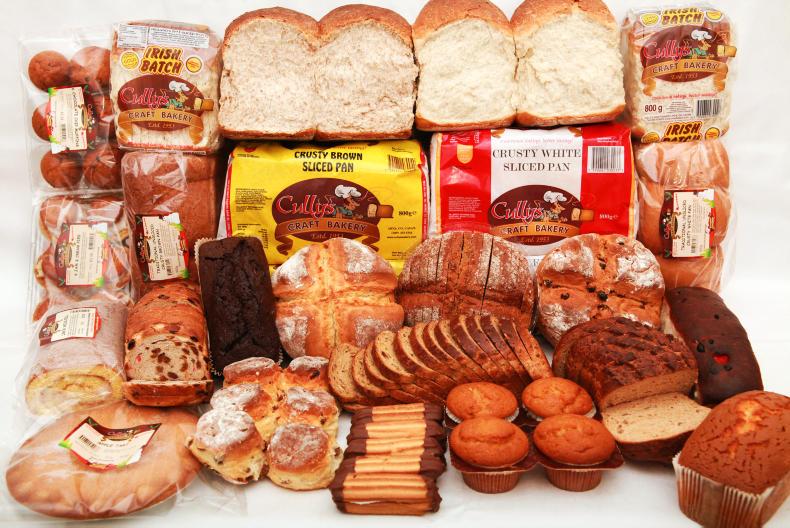
Cully's Craft Bakery range.
“The flour we use is the top grade and our flour is 14% protein,” says Brian. “We bought cheap flour once and we couldn’t use it. It just wasn’t the same. We put a lot of time into mixing, resting and baking the bread. There is a big difference. The lads come in to work for about 8pm and work through the night. So, the bread is ready by morning to be delivered to shops still warm from the oven.”
The pair are not impressed with a lot of the misconceptions that are out there about bread.
“There is a lot of bad publicity about bread out there,” says Barney. “A lot of that is coming from America where bread is full of additives. People ask: ‘Is that bleached flour?’ You can’t get bleached flour in either Ireland or England. It’s trying to get people to see that. Any nutritionist will tell you that it is everything in moderation.
“Too many believe everything they hear from these unqualified bloggers and the likes. For instance, I have been asked by young and old if there is yeast in our soda bread. There has never been yeast in soda bread! People don’t know what’s in their food anymore.”
As members of the Flour Confectioners and Bakers Association, Cully’s bread vans are a familiar sight on the roads of Cavan and adjoining counties early each morning, but Brian and Barney admit their biggest challenge to date is the closing of small country shops and post offices.
“There used to be three or four dozen loaves going into those shops every day. Small towns and villages are left empty,” says Barney.
“People start going to bigger towns,” adds Brian. “It affects everyone, from the grocer to us.”
Read more
Brothers in grain
The proof is in Pudding Row
National Bread Week runs from 10-16 September and celebrates all that is great about Irish loaves. Events will be taking place in bakeries and stores across Ireland, with lots of tastings and promotions on offer. For further information, visit www.nationalbreadweek.ie or join the conversation on Twitter at #BreadLover
Durrow Mills
In 2015, Lisa Larkin and her husband Tom recognised a gap in the Irish food market. Marrying this with a passion for real and wholesome food and an understanding of common digestive issues, Lisa began milling sprouted wheat flour at her very own Durrow Mills.
Lisa journeyed the road less travelled with her sprouted wheat business, as she is the first and only producer of the flour in Ireland and the UK, which was launched officially at Ploughing 2017. Originally from Glenageary in Dublin, Lisa settled with husband Tom and their four kids in his home county of Westmeath 11 years ago.
“I’ve always had a real interest in country life,” she explains. “I wouldn’t move for anything now. I love giving back to the community and so I always want my business to remain local.”

Lisa Larkin, Durrow Mills.
Lisa and Tom both completed a bachelor in agricultural science at UCD. He specialised in engineering while she went on to do a research master’s in animal reproduction.
Digestive issues in Lisa’s family led her to sprouted wheat.
“I really wanted to try it. But I couldn’t get it in Ireland,” she says. “It was only made in the USA at the time and was very expensive to import.”
While ordinary flour is formed when the cereal grain is directly milled, Lisa’s sprouted flour comes from organic, high protein grain, placed in large vessels to be rehydrated. It is left to germinate to a correct stage before being very gently dried. Then it is stone milled.
“It is a very tricky product to make. We had to build all of the equipment ourselves,” Lisa explains.
“The germination of the grain changes all the properties of the grain. It breaks down indigestible portions of the grain that are naturally there. It also makes it more nutritious.”
The sprouting of the grain adds another three or four days on to the overall process. Despite the cost of time, Lisa is delighted to support wholesome and traditional food prep. Many people who have turned away from other wheat products due to digestive problems have reported positively on Lisa’s sprouted wheat.
“Sprouting is just one method to break down the indigestible portions of the grain,” she says. “It’s just going back to real food.”
Every step of this specialised milling is done by Lisa and Tom. “You need to monitor everything very carefully,” she says of the process. “It took me a long time to get it right and come up with a high-quality product that is good for baking.”

Durrow Mills.
Describing her product, Lisa says, “it is a very versatile flour. You use it in place of or blend it in with other flour. It is high in fibre because we use the whole grain. It has much higher protein as well,” she explains.
As a member of the “Real Bread Ireland Campaign”, Lisa hopes for a return to “real bread” without additives; “just water, flour and a pinch of salt.”
“Bread used to be the staple diet of everyone,” she says. “It seems now that bread has been villainised. I think eating natural and seasonal food is the best kind of diet. I am a believer in organic as I do wonder about pesticides and other chemicals leaking into the food chain. But this is not a trend. It’s just about eating proper food without the additives and preservatives. Everything in moderation.”
Durrow Mills is a growing success, with a recent Blas na hEireann chef’s choice award, a nomination for the Food and Drink Business awards and an innovation voucher from Enterprise Ireland, with plans to open a small research and development bakery for taste and trial purposes and to give them a new opening at food festivals.
“As flour is a raw product, it is very difficult to get people to adopt a new product without having tried it,” says Lisa. “Once they can taste it, they generally really like it. So, that’s why we are opening the research and development bakery.”
Although her main focus lies with supplying bakeries with the flour, this year Lisa hopes to introduce new flours to the Durrow Mills range, as well as export her products.
Visit www.durrowmills.com for Lisa’s recipes.
Abbey Bread
At just 17, Tipperary teen Manus Heenan has revived and relaunched Abbey Bread based on the original recipe used for over 100 years by Mount St Joseph Abbey, Roscrea, Co Offaly.
What started as a TY mini company project at the Cistercian College, took Manus to the final of the student enterprise awards in Dublin in November 2017, where he won both the overall senior and social media awards.
Hailing from a tillage farm in Terryglass, the young entrepreneur is never idle as he turns his talents to rugby, soccer, hurling, golf, tennis and music. The go-getter explains how Abbey Bread came back to life.
“At the start of TY everyone is encouraged to start up a business. This was a bread that the monks used to make here in the monastery. They stopped about 10 years ago. I thought it would be cool if someone did it again. So, I met with brothers Malachi, John and Oliver, who used to bake the bread. They were delighted that someone wanted to get it going again,” explains Marcus.

Manus Heenan, Abbey Bread entrepreneur.
“I started by trying to make the bread itself but that was too much with school and everything else. So, then I decided to focus on the bread mix.”
The preservative-free mix, available in wholemeal or white, is steeped in heritage.
“At its peak, over 200 loaves a day were produced and the bread had a loyal following among students and the local community. All the locals around Roscrea knew about the bread, so were delighted to hear it was back,” Manus reports. The struggle in balancing school, multiple hobbies and a business did not stop the young man, despite the challenges.
“The ovens they used were different,” he explains. “They were turf-fired and people always said it was because of those ovens that the bread was so nice. But the monks actually said themselves that it could work just as well in a conventional oven. So, I had to tweak the recipe a lot to perfect it and eventually I did.”
The future is bright for this rising baker whose business plan was commended by judges at the student enterprise awards.
“They wanted to see how you could develop and critique your business plan. It started off with a county competition and after winning that I got into all the shops with my recipe. Then I introduced the white bread mix. They were impressed by how much I moved it on in two months,” says Manus.
“It has given me a great insight into the world of business in general. I really enjoy it and I would love to upscale but at the moment school has to come first.”
The recipe, however, will remain a secret in the safe hands of Marcus.
“You need to buy the mix to be able to make the bread,” he laughs.
Visit Abbey Bread Facebook page for more baking ideas.
Cully’s Craft Bakery
Barney Cully and his son, Brian, run Cully’s Craft Bakery in Arva, Co Cavan. Established in 1953 by Barney’s uncle Michael, it was later taken over after his sudden death by his wife Kathleen, who invited the then 18-year-old Barney to come into the business; after a short-lived education at baking school.
“I was about eight months in baking school when a fella who drove one of the vans got sick. I came home that weekend to fill in for him ... and I have been on the road ever since. That’s why I made sure Brian got his degree in baking,” says Barney.
As they say, old habits die hard and that’s why the bakery’s recent move to a new site on the Cavan Road didn’t come easy to Barney.
“We had two old draw plate ovens about 12ft long. They are the guts of 150 years old and there aren’t too many of them left. That’s how we bake our batch loaves, so I was concerned about moving them,” he explains.
“But we bought two new ovens and moved out here. We have plans to bring our old ovens out here and use them again.”
While Cully’s Craft Bakery produces the batch in unsliced and sliced variations, it is the traditional unsliced batch that is the novelty. The family bakery maintain their traditional batch with high-quality ingredients.

Brían and Barney Cully of Cully's Craft Bakery in Arva, Co Cavan.

Cully's Craft Bakery range.
“The flour we use is the top grade and our flour is 14% protein,” says Brian. “We bought cheap flour once and we couldn’t use it. It just wasn’t the same. We put a lot of time into mixing, resting and baking the bread. There is a big difference. The lads come in to work for about 8pm and work through the night. So, the bread is ready by morning to be delivered to shops still warm from the oven.”
The pair are not impressed with a lot of the misconceptions that are out there about bread.
“There is a lot of bad publicity about bread out there,” says Barney. “A lot of that is coming from America where bread is full of additives. People ask: ‘Is that bleached flour?’ You can’t get bleached flour in either Ireland or England. It’s trying to get people to see that. Any nutritionist will tell you that it is everything in moderation.
“Too many believe everything they hear from these unqualified bloggers and the likes. For instance, I have been asked by young and old if there is yeast in our soda bread. There has never been yeast in soda bread! People don’t know what’s in their food anymore.”
As members of the Flour Confectioners and Bakers Association, Cully’s bread vans are a familiar sight on the roads of Cavan and adjoining counties early each morning, but Brian and Barney admit their biggest challenge to date is the closing of small country shops and post offices.
“There used to be three or four dozen loaves going into those shops every day. Small towns and villages are left empty,” says Barney.
“People start going to bigger towns,” adds Brian. “It affects everyone, from the grocer to us.”
Read more
Brothers in grain
The proof is in Pudding Row











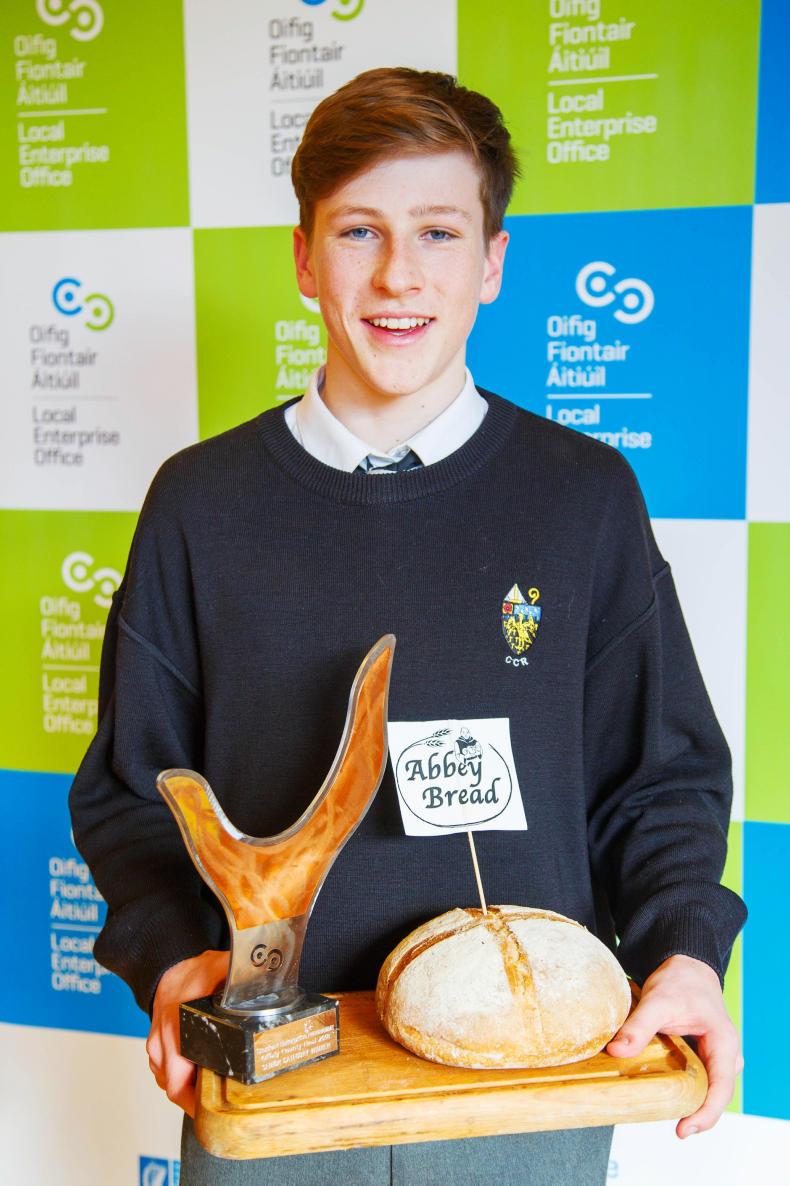
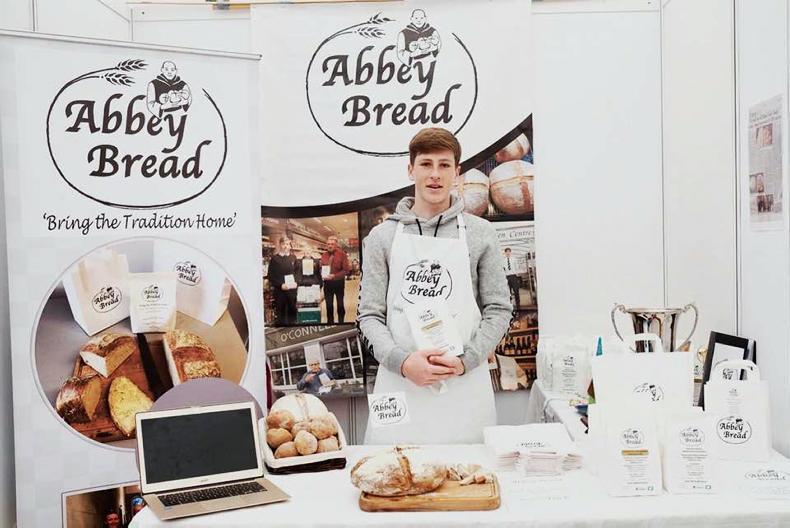


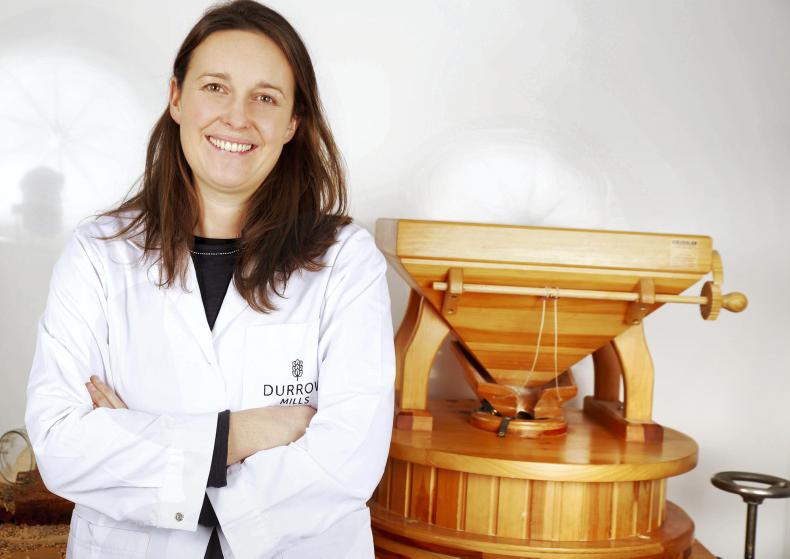
SHARING OPTIONS